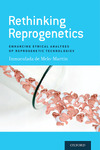Please use this identifier to cite or link to this item:
http://lib.hpu.edu.vn/handle/123456789/28878Full metadata record
| DC Field | Value | Language |
|---|---|---|
| dc.contributor.author | Melo-Martín, Inmaculada de | en_US |
| dc.date.accessioned | 2018-01-12T08:21:11Z | |
| dc.date.available | 2018-01-12T08:21:11Z | |
| dc.date.issued | 2017 | en_US |
| dc.identifier.isbn | 9780190460204 | en_US |
| dc.identifier.isbn | 9780190460211 | en_US |
| dc.identifier.other | HPU2161802 | en_US |
| dc.identifier.uri | https://lib.hpu.edu.vn/handle/123456789/28878 | - |
| dc.description.abstract | Reprogenetic technologies, which combine the power of reproductive techniques with the tools of genetic science and technology, promise prospective parents a remarkable degree of control to pick and choose the likely characteristics of their offspring. Not only can they select embryos with or without particular genetically-related diseases and disabilities but also choose embryos with non-disease related traits such as sex. Prominent authors such as Agar, Buchanan, DeGrazia, Green, Harris, Robertson, Savulescu, and Silver have flocked to the banner of reprogenetics. For them, increased reproductive choice and reduced suffering through the elimination of genetic disease and disability are just the first step. They advocate use of these technologies to create beings who enjoy longer and healthier lives, possess greater intellectual capacities, and are capable of more refined emotional experiences. Indeed, Harris and Savulescu in particular take reprogenetic technologies to be so valuable to human beings that they have insisted that their use is not only morally permissible but morally required. Rethinking Reprogenetics challenges this mainstream view with a contextualised, gender-attentive philosophical perspective. De Melo-Martín demonstrates that you do not have to be a Luddite, social conservative, or religious zealot to resist the siren song of reprogenetics. Pointing out the flawed nature of the arguments put forward by the technologies' proponents, Rethinking Reprogenetics reveals the problematic nature of the assumptions underpinning current evaluations of these technologies and offers a framework for a more critical and sceptical assessment. | en_US |
| dc.format.extent | 305p. | en_US |
| dc.format.mimetype | application/pdf | en_US |
| dc.language.iso | en | en_US |
| dc.publisher | Oxford University Press | en_US |
| dc.subject | Genetic engineering | en_US |
| dc.subject | Reproductive Techniques | en_US |
| dc.subject | Assisted | en_US |
| dc.subject | Ethics | en_US |
| dc.title | Rethinking reprogenetics: enhancing ethical analyses of reprogenetic technologies | en_US |
| dc.type | Book | en_US |
| dc.size | 1.95 MB | en_US |
| dc.department | Sociology | en_US |
| Appears in Collections: | Sociology | |
Files in This Item:
| File | Description | Size | Format | |
|---|---|---|---|---|
| Rethinking-reprogenetics.pdf Restricted Access | 2 MB | Adobe PDF |  View/Open Request a copy |
Items in DSpace are protected by copyright, with all rights reserved, unless otherwise indicated.
